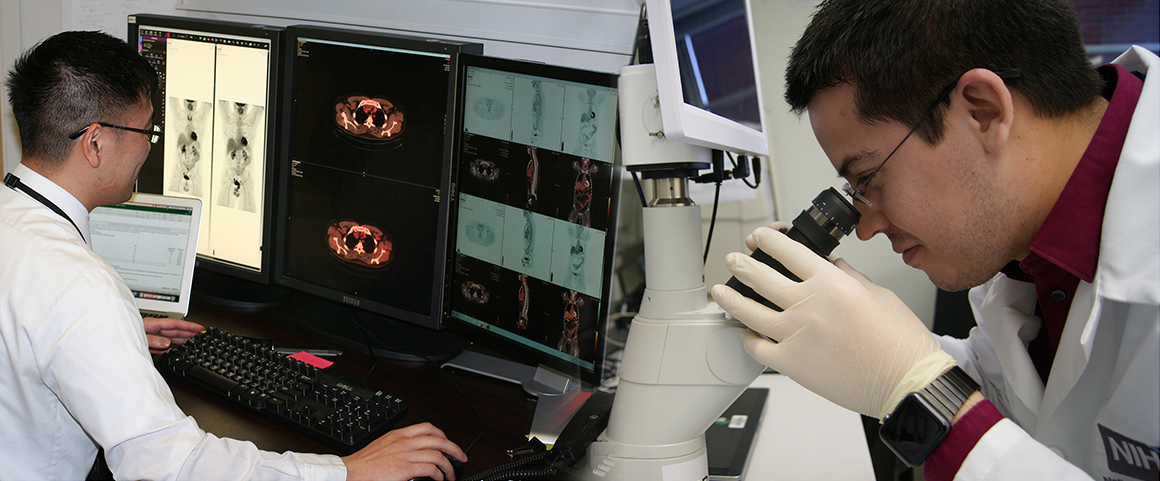
Photos left to right: 2016-2017 MRSP Scholars Jeffrey Lin and Alejandro Bugarini working at the NIH.
Building a Critical Pipeline of Clinician Scientists
According to the American Medical Association, the percentage of physicians engaged in research and teaching has decreased in past decades. This concerning statistic means that there are fewer clinician scientists that play the vital role of understanding basic biology and scientific discovery while considering the potential benefits to patients.
Since 1998, the FNIH has helped build a pipeline of clinician scientists by supporting training programs and fellowships at the National Institutes of Health (NIH). This work began by raising private funds for the NIH Clinical Research Training Program (CRTP). For more than a decade, the program attracted research-oriented medical, dental and veterinary students to receive training at the NIH. An analysis of the program found that CRTP fostered student careers, as nearly two-thirds of participants are still conducting clinical research.
Training at the NIH continues through FNIH-supported initiatives, such as the Amgen Scholars program, scholar education funded by the Jayne Koskinas Ted Giovanis Foundation for Health and Policy, the Sallie Rosen Kaplan Postdoctoral Fellowship for Women Scientists in Cancer Research and the Medical Research Scholars Program (MRSP), which has furthered the legacy of CRTP since 2012. In 2016, 52 students participating in MRSP began one-year training at the NIH, conducting research projects with close mentorship from investigators in areas including cancer, cardiology and neurology. Students also participated in workshops on leadership, entrepreneurship and drug development, in addition to clinical teaching rounds at the NIH Clinical Center. The NIH and the private sector—with funds raised through the FNIH—have supported nearly 240 fellows through the MRSP to date.
Beyond training programs, the FNIH funds individual fellows in the laboratories of NIH researchers advancing therapies for diseases such as cancer. The Stephen J. Solarz Memorial Fund, established in 2010, honors FNIH Board Member Nina Solarz’s late husband and U.S. Congressman who received treatment for esophageal cancer at the National Cancer Institute (NCI). The Fund supports fellowships in the laboratory of David Schrump, M.D., Chief of the Thoracic and Gastrointestinal Oncology Branch in the Center for Cancer Research of the NCI, whose research stimulates a patient’s immune system into fighting and preventing different types of new cancer growth. The two-year, fully funded fellowships train post-doctorate scientists and researchers from abroad so they can return to their home countries with knowledge that will benefit their local communities.
Another fellowship managed by the FNIH focuses on renal cell cancer research—the most common type of kidney cancer. The Dean R. O’Neill Renal Cell Cancer Research Fund and the Dr. Edward T. Rancic Memorial Fund for Cancer Research have sponsored the full-time fellow for the last 10 years in the laboratory of Richard W. Childs, M.D., Senior Investigator, Laboratory of Transplantation Immunotherapy, at the National Heart, Lung, and Blood Institute. Since 2007, lab fellows, including current fellow Emily Levy, have advanced work in renal cell cancer research in hopes of finding a cure for kidney cancer.
These training programs and fellowships are critical for developing a pipeline of clinician scientists who are ready to meet the demands of the changing population. But beyond this, they will help further innovation in biomedical research for years to come.